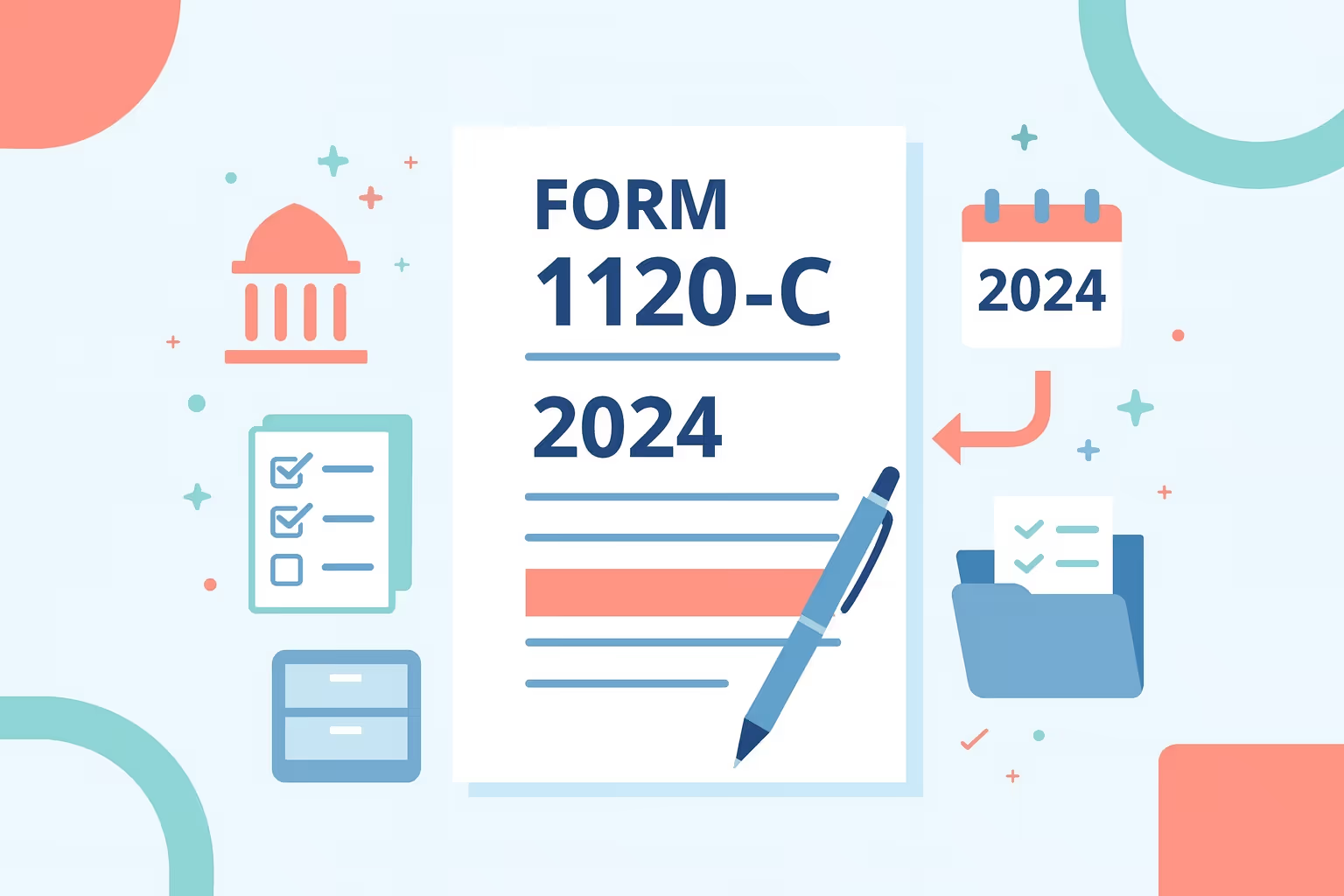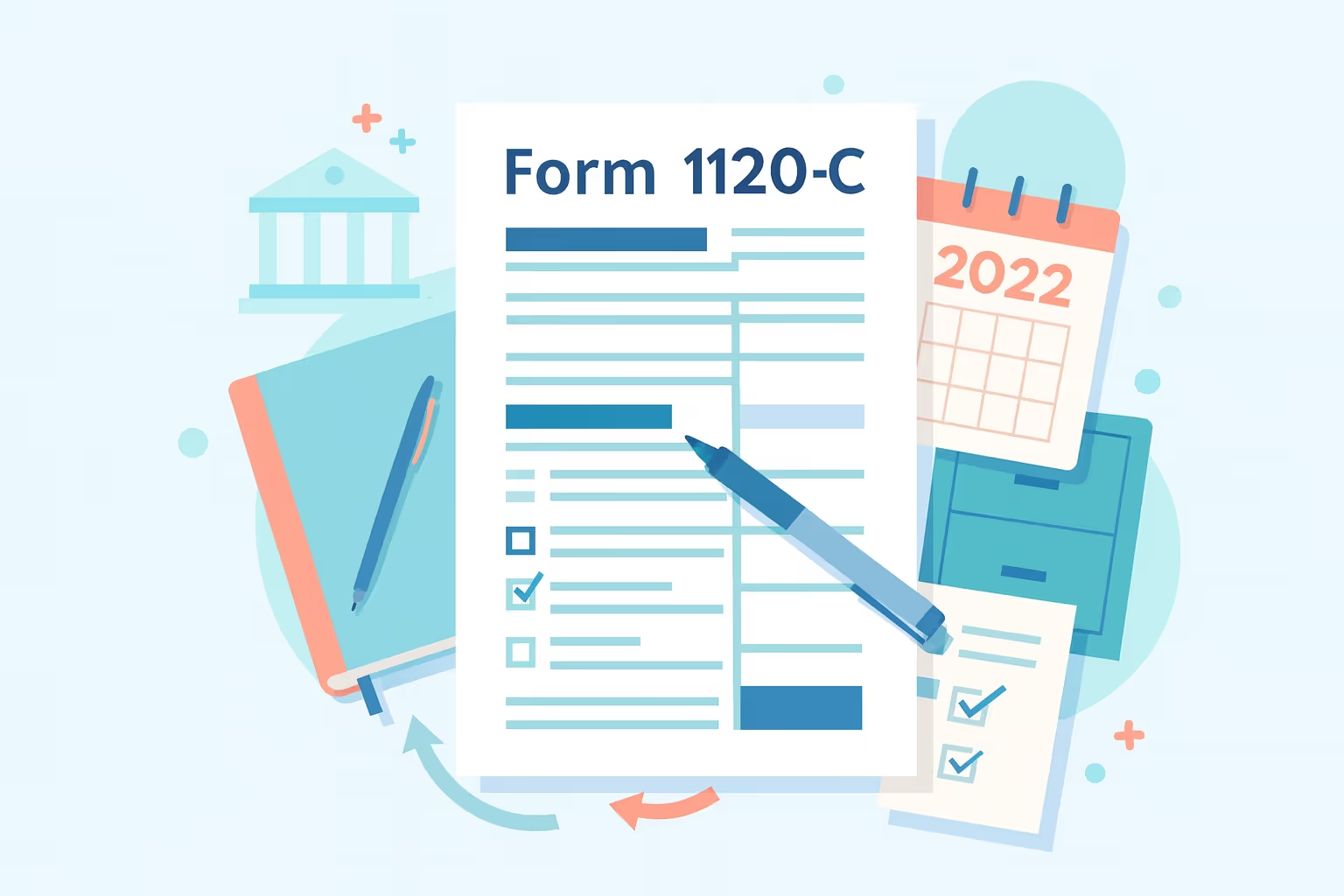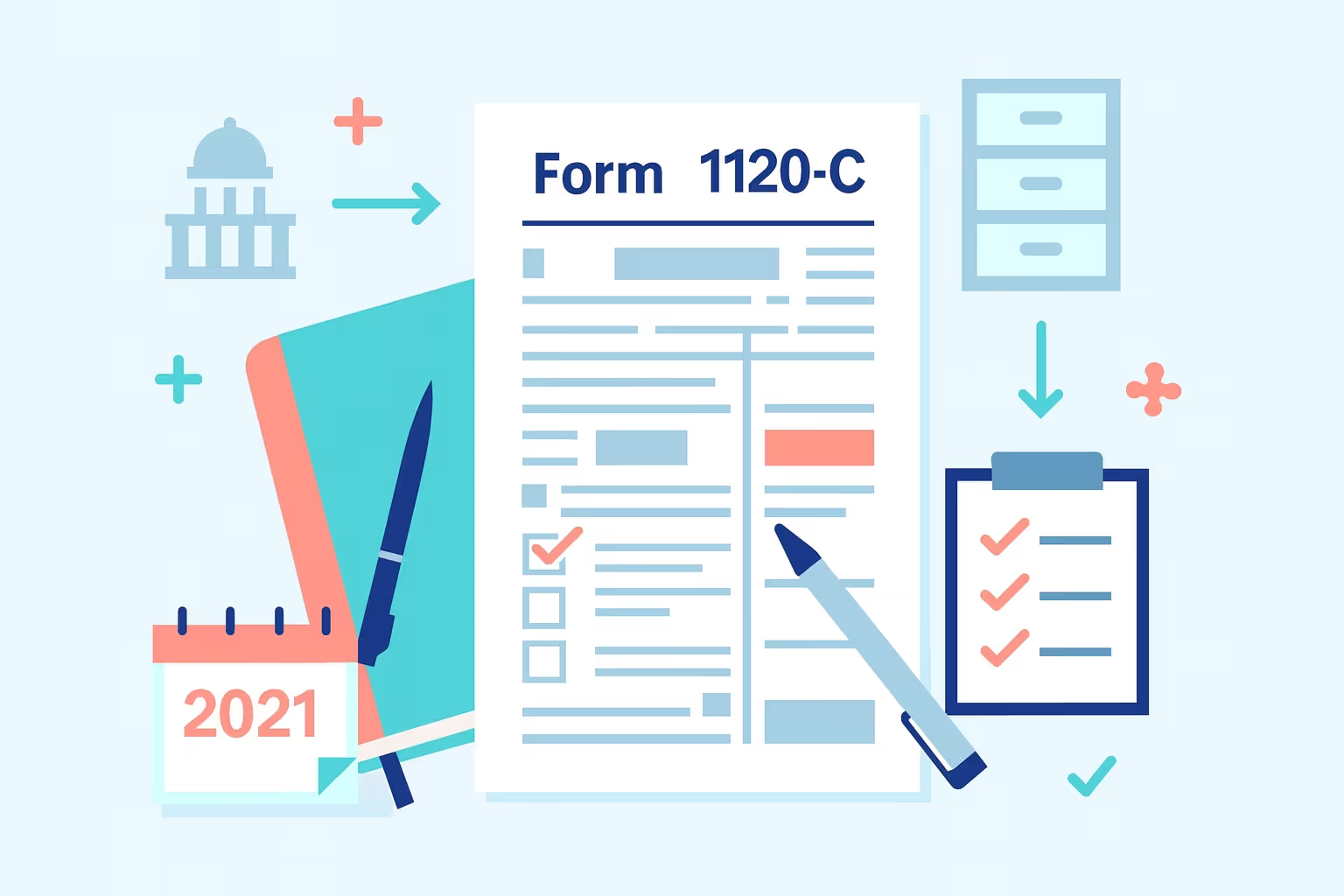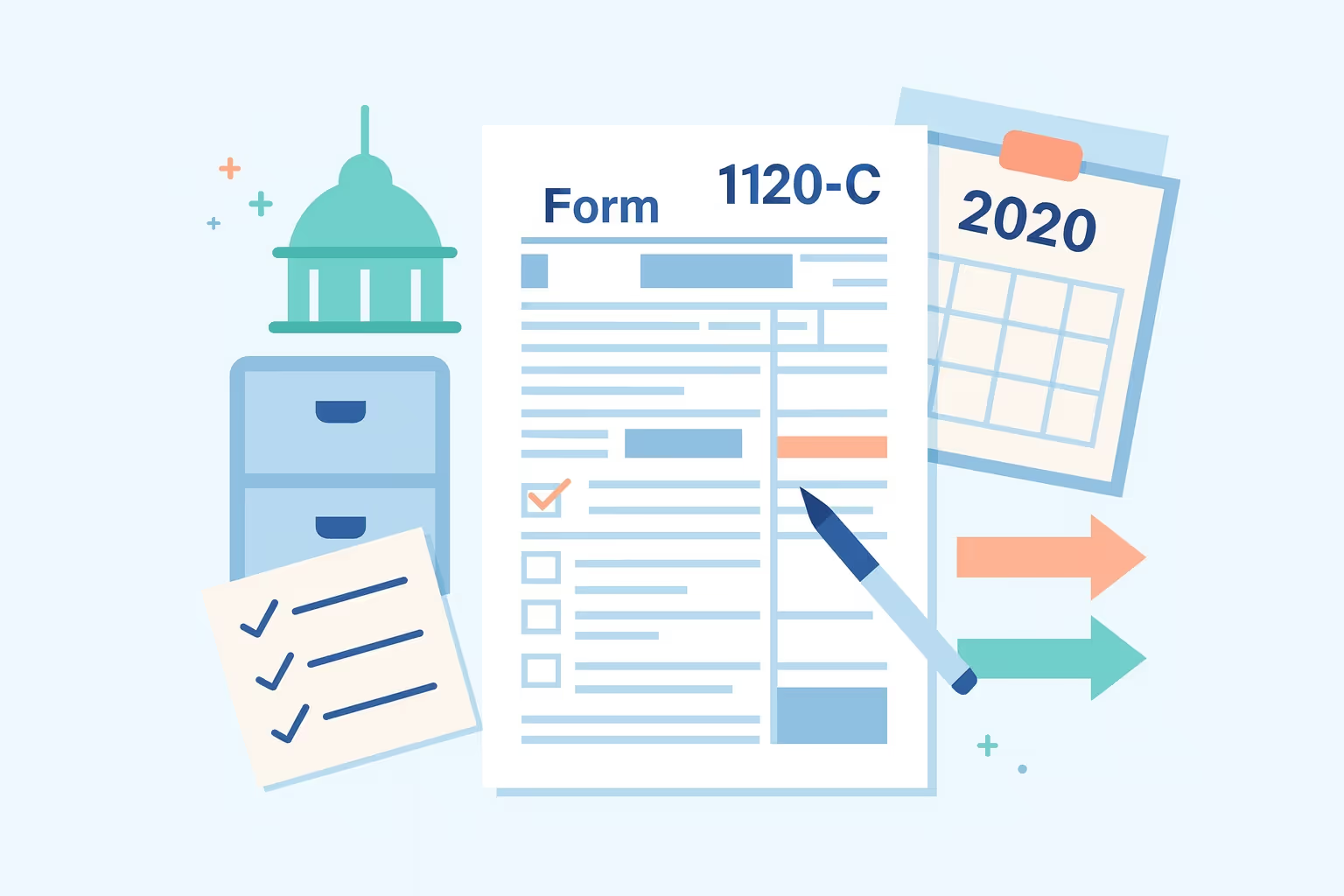
Filing Form 1120-C for the 2016 tax year is an essential responsibility for cooperative associations that operate on a patronage basis. This specialized income tax return allows a cooperative to report its income, deductions, and dividends while meeting federal requirements under the Internal Revenue Code. Each organization must ensure the information provided is accurate, as errors in taxable income or deductions can result in penalties or delayed processing by the IRS.
For tax purposes, cooperative associations differ from regular corporations because they distribute profits to members based on their business activity, rather than stock ownership. The process of preparing the return involves calculating financial results, identifying deductible expenses, and ensuring that all necessary schedules and statements are completed correctly. The form helps determine the taxes owed or refunds due, depending on the organization's income and credits claimed during the year.
Every step required to file Form 1120-C 2016 instructions properly is covered in this cooperative tax guide, from comprehending filing requirements to disclosing income, gains, and losses. Clear explanations are provided for readers unfamiliar with complex tax terminology. A cooperative can maintain compliance, meet all federal filing requirements, and steer clear of typical errors when filing its return to the IRS by carefully reading each section.
Understanding Form 1120-C
Cooperative associations submit their income, deductions, credits, and dividends to the Internal Revenue Service on Form 1120-C, the federal income tax return for cooperatives. This form is only applicable to organizations that are set up and run in accordance with Internal Revenue Code Section 1381. It guarantees that cooperatives fulfill all federal filing requirements for the relevant tax year, accurately determine their taxable income, and claim deductions.
What is Form 1120-C?
The official document for reporting financial activity is Form 1120-C, also referred to as the U.S. Income Tax Return for Cooperative Associations. It enables cooperatives to reveal their earnings, operational costs, and distributions to members. Cooperatives avoid double taxation by only being taxed on retained earnings following member distributions, in contrast to regular corporations.
This form also provides the IRS with detailed information on how a cooperative determines its income and applies deductions related to wages, interest, and dividends. The process ensures transparency and proper taxation of all business activities.
Who Must File Form 1120-C?
The following types of entities are required to file Form 1120-C:
- Farmers' cooperatives that market or purchase goods for members or process agricultural products.
- Consumer cooperatives that operate for the benefit of their members, such as retail or housing cooperatives.
- Worker cooperatives are organized to provide employee ownership and profit sharing.
- Marketing or purchasing cooperatives that handle goods or services on behalf of members.
- Nonexempt and Section 521 cooperatives, both of which must file annually regardless of income level.
Each cooperative must file even if it has no taxable income during the tax year. Filing ensures compliance and maintains good standing with federal tax requirements.
Filing Requirements Overview
- A cooperative must be formally established and operated in accordance with the principles of cooperation.
- It must divide profits according to business done with members or pay out patronage dividends.
- All income, credits, gains, losses, and deductions incurred during the tax year must be reported on the return.
- If a cooperative is incorporated and operating, it must still file even if it has no revenue or activity.
- Before submitting, each organization should visit the official IRS website to review the address updates and filing deadlines.
Inaccurate filing can result in fines, processing delays, or the loss of certain tax benefits.
Cooperative associations can correctly report their financial performance and satisfy their legal requirements by understanding Form 1120-C. A cooperative can effectively finish the filing process and stay in compliance with the IRS by ensuring that all necessary forms are attached, carefully reviewing income and deductions, and verifying that the correct paperwork is in place.
What's New for Tax Year 2016?
For tax year 2016, several important updates affected how cooperative associations file their income tax return. These revisions introduced new filing deadlines, penalty rules, and provisions for specific types of income. Understanding these updates helps cooperatives stay compliant and avoid costly mistakes.
New Filing Due Dates
- The standard due date for most cooperative associations changed to the 15th day of the 4th month after the end of the tax year. For calendar-year filers, this typically falls on April 15.
- Cooperatives that qualify under Section 6072(d) must file by the 15th day of the 9th month after their fiscal year ends.
- Cooperatives with a June 30 fiscal year-end must file by the 15th day of the 3rd month after their year closes, generally September 15.
- Organizations are encouraged to verify the current year's due date on the IRS website to ensure accuracy before filing their tax returns.
Revised Penalties and Special Provisions
- The minimum late filing penalty increased to $205 or the total amount of tax due (whichever is smaller) for returns filed more than 60 days late.
- Cooperatives that earn qualified timber gains are now subject to a special alternative tax rate of 23.8 percent on that portion of their income.
- The IRS continues to require electronic funds transfers (EFT) for all federal tax deposits, ensuring secure and traceable payments.
- Forms such as 1125-A (Cost of Goods Sold) and 1125-E (Compensation of Officers) remain mandatory when specific financial thresholds are met.
These updates underscore the importance of proactive planning. Cooperatives should review changes annually, maintain accurate financial records, and confirm that their reporting aligns with current IRS regulations before filing their return.
Preparing to File
Accurate preparation is essential for any cooperative before completing Form 1120-C. Gathering all required records, confirming details with the IRS, and reviewing prior-year filings can significantly reduce errors and streamline the filing process.
Required Records and Documents
- Prior-year Form 1120-C: Provides a reference for previous income, deductions, and adjustments.
- Financial statements: Include the balance sheet, income statement, and retained earnings statement to support figures reported on the return.
- Bank statements and interest summaries: Confirm all deposits, withdrawals, and earned interest during the tax year.
- Dividend payment records: Document all member dividends distributed during the year for proper reporting on Schedule H.
- Depreciation schedules: List all business assets, their acquisition costs, and accumulated depreciation to ensure accurate deductions.
- Supporting statements: Include explanations for unusual or complex transactions that affect income or deductions.
Preparation Checklist
- Make sure the Employer Identification Number (EIN) of the cooperative matches the records maintained by the IRS.
- Verify the company's accounting and fiscal year-end procedures to ensure accuracy and compliance with relevant regulations.
- Examine shareholder and member accounts to make sure capital allocations and patronage dividends are accurately documented.
- Before finishing Schedule G, separate the revenue from patronage and nonpatronage sources.
- Verify all state-specific requirements, as some may have extra reporting forms or cooperative filing regulations.
A cooperative can file more quickly and reduce the possibility of penalties or IRS correspondence after submission by being organized during the preparation process.
Step-by-Step Form 1120-C Instructions
The following guidance outlines how cooperative associations should complete Form 1120-C accurately. Each section of the form requires precise reporting to ensure compliance and proper calculation of taxable income.
Completing the Header Section
- Enter the cooperative's legal name, address, and EIN exactly as registered with the IRS to prevent processing delays.
- Indicate whether the cooperative is exempt under Section 521 or a nonexempt cooperative.
- Check any applicable boxes for special conditions, such as initial return, final return, amended return, name change, or address change.
- If filing a consolidated return, include the appropriate forms (such as Form 851 and Form 1122) to authorize inclusion of subsidiary entities.
Reporting Income (Lines 1–10)
- Record gross receipts or sales from all business operations, including sales to members and nonmembers. Subtract returns and allowances to calculate net sales.
- If the cooperative has a cost of goods sold, complete and attach Form 1125-A to support the reported amount.
- Include other sources of income, such as dividends received, interest earned, rental income, and capital gains.
- Add all income items to determine total income for the tax year, which forms the basis for taxable income calculations.
Claiming Deductions (Lines 11–24)
- Enter compensation for officers and employee wages, ensuring Form 1125-E is attached if total receipts exceed $500,000.
- Deduct rent, taxes, and interest paid on business property, loans, or mortgages.
- Include charitable contributions, limited to 10 percent of taxable income before these deductions.
- Report depreciation and amortization by attaching Form 4562 if claiming these deductions.
- List other deductions such as insurance premiums, professional services, utilities, office expenses, and travel costs on an attached statement.
- Total all deductions and subtract them from the total income to determine taxable income before adjustments.
Completing Schedules
- Schedule C: Report dividends received from other corporations and calculate any special deductions.
- Schedule G: Distinguish between patronage and nonpatronage income to ensure accurate tax treatment.
- Schedule H: Report all patronage dividends and Section 1382 deductions claimed for the year.
- Schedule K: Provide information about accounting methods, ownership details, and foreign accounts if applicable.
- Schedules L and M-1: Present beginning and ending balance sheets and reconcile book income with the income reported on the tax return.
Completing each section carefully ensures that all financial information is appropriately documented and consistent across schedules. By following these instructions, cooperative associations can reduce errors, maintain compliance, and confidently file their income tax return with confidence and accuracy.
Filing and Payment Procedures
Accurate filing and timely payment are crucial for cooperative associations to remain compliant with federal tax laws. Form 1120-C for the 2016 tax year must be filed on paper, and all federal tax payments must be made electronically through approved IRS systems.
How do you file Form 1120-C (Paper Only)?
- All cooperatives are required to file Form 1120-C on paper for the 2016 tax year. Electronic filing was not yet available for this form.
- Mail the completed return and all required schedules to the Internal Revenue Service Center in Ogden, Utah, using the address specified in the IRS instructions.
- For cooperatives located outside the United States or in U.S. territories, use the Ogden, Utah, P.O. Box address designated for foreign filers.
- When mailing, include all required attachments, such as Forms 1125-A, 1125-E, 4562, and any supporting statements in the correct order.
- Use certified mail or a trackable delivery service to confirm receipt by the IRS. This provides proof of timely filing in case of processing delays.
Paying Taxes Electronically
- All federal tax deposits, including estimated payments and balance due amounts, must be made using the Electronic Federal Tax Payment System (EFTPS).
- Cooperatives must enroll in EFTPS before submitting payments. The system allows for online or phone payments and provides confirmation numbers for tracking.
- Payments must be scheduled by 8 p.m. Eastern Time the day before the due date to be considered timely.
- Cooperatives can also use EFTPS to pay estimated taxes throughout the year, ensuring steady compliance and avoiding late payment penalties.
- Those unable to pay the full amount at once may submit Form 9465 (Installment Agreement Request) with their return to request a monthly payment plan.
Using the correct mailing process and ensuring timely EFTPS payments reduces administrative delays and potential interest or penalties on unpaid balances.
Common Mistakes and How to Avoid Them
Even minor filing errors can lead to penalties or delays in processing a cooperative's income tax return. Understanding frequent mistakes helps organizations review their filing process and ensure compliance before submission.
Frequent Filing Errors
- Using the wrong filing due date can result in processing delays or penalties. Many cooperatives mistakenly rely on outdated deadlines. Always confirm the current due date for the tax year on IRS.gov before filing.
- Submitting the return to an incorrect mailing address may cause a delay in processing. Returns sent to the wrong IRS center are often returned or rejected. Always double-check the current Ogden, Utah mailing address before submission.
- Failing to provide the required signatures renders the return invalid. The return must be signed by an authorized officer, such as the president, vice president, or treasurer. The IRS does not accept unsigned returns.
- Omitting required schedules can result in the IRS issuing notices or rejecting the filing. Schedules such as G, H, or 1125-E must be attached whenever needed to ensure completeness.
- Misclassifying patronage and non-patronage income can lead to inaccurate reporting. This error directly affects taxable income and deductions. Each category must be separated adequately on Schedule G.
Tips for Error Prevention
- Review all entries for accuracy, especially totals on income and deduction lines.
- Cross-check figures between schedules and the main form to ensure they reconcile.
- Keep copies of all forms, schedules, and supporting documentation for at least three years after filing.
- Schedule payments in advance through EFTPS and confirm submission dates.
- Consider having the return reviewed by a professional familiar with cooperative tax rules before mailing.
By reviewing the return carefully and following these preventive steps, a cooperative can reduce the likelihood of penalties and maintain good standing with the IRS.
Special Situations and Dormant Cooperatives
Some cooperative associations may experience years with minimal or no activity. Even in these cases, most are still required to file Form 1120-C to maintain compliance with federal regulations.
Filing for a Dormant or Zero-Activity Year
- A cooperative must file if it remains legally incorporated or maintains its business registration, even if it has no income or assets.
- Cooperatives that hold assets, bank accounts, or investments should still report interest or minimal income.
- If all operations have ceased permanently, and the cooperative has been legally dissolved, filing may not be required for that year.
- The income section of the return can reflect zero activity; however, small expenses, such as state fees or professional services, should still be reported as deductions.
Maintaining Good Standing with the IRS
- Filing a return annually, even during dormant years, preserves a cooperative's tax history and ensures it remains in good standing with the IRS.
- Consistent filing also protects the cooperative's corporate status at the state level and avoids unnecessary correspondence or penalty notices.
- Maintaining accurate records of small transactions, such as bank charges or fees, helps document that the cooperative remains organized and compliant.
Filing for dormant or low-activity years demonstrates transparency and accountability. This practice prevents complications if the cooperative resumes operations in the future or undergoes an IRS review.
Recordkeeping and Year-Round Compliance
Proper recordkeeping is essential for cooperative associations to maintain compliance with IRS requirements and to support all figures reported on Form 1120-C. Keeping well-organized records helps in preparing accurate returns, responding to IRS inquiries, and managing financial planning for future tax years.
Essential Records to Maintain
- Financial statements: Retain balance sheets, income statements, and cash flow reports to support income and deduction entries.
- Bank statements and reconciliations: Keep records of deposits, withdrawals, and any interest earned on cooperative accounts.
- Member records: Maintain detailed information on patronage dividends, member payments, and capital account balances.
- Supporting documents: Store receipts, invoices, and contracts for all deductible expenses, including wages, rent, and utilities.
- Depreciation and asset schedules: Maintain documentation that shows the original cost, depreciation method, and accumulated depreciation for business assets.
- Filed returns and correspondence: Preserve copies of all prior-year returns and any communication with the IRS regarding your cooperative's account.
Record Retention Periods
- The IRS generally requires records to be kept for at least three years after the date the return is filed.
- Records related to asset purchases or depreciation should be kept for as long as the asset is owned, plus three years after it is sold or disposed of.
- Documents related to employment taxes must be retained for four years after the tax is due or paid, whichever is later.
Year-Round Compliance Practices
- Schedule quarterly reviews of financial statements to identify discrepancies early.
- Use accounting software to automate income and expense tracking.
- Conduct annual board reviews of cooperative financial performance.
- Keep digital backups of all financial data and ensure sensitive files are stored securely.
Maintaining thorough and accurate records throughout the year simplifies tax filing and strengthens compliance during IRS audits or cooperative reorganizations.
Frequently Asked Questions
What is the purpose of Form 1120-C for cooperative associations?
Form 1120-C is the income tax return used by cooperative associations to report income, deductions, and dividends to the IRS. It serves as the official document for tax purposes, ensuring that a cooperative correctly calculates its taxable income. By filing this form, a cooperative confirms that it is organized in compliance with federal requirements, accurately reports its profits and losses, and maintains transparency with its members and shareholders each tax year.
Who must file Form 1120-C for the 2016 tax year?
All cooperative associations operating under Section 1381 of the Internal Revenue Code must file Form 1120-C, regardless of profit or losses. This includes farmers, consumers, workers, and marketing cooperatives that distribute earnings to members. Even if a cooperative had minimal income or activity during the tax year, it must still file to meet IRS requirements, preserve its business status, and avoid penalties or compliance issues.
How does a cooperative determine taxable income?
A cooperative determines taxable income by calculating its total revenue, subtracting allowable deductions and credits, and including any patronage dividends distributed to members. Reportable items include sales, interest, and capital gains. Deductions typically cover wages, rent, and depreciation. The result is the cooperative's taxable income, which is subject to federal taxes. This process ensures accurate reporting and helps maintain compliance with IRS filing standards and cooperative accounting terms.
What deductions can a cooperative claim on Form 1120-C?
A cooperative can claim deductions for ordinary and necessary business expenses, including wages, rent, depreciation, and interest. Additional deductions may cover patronage dividends, professional services, and charitable contributions made during the tax year. Each expense must be supported by financial statements and receipts. Accurate reporting of these deductions helps reduce taxable income, ensuring that the cooperative only pays taxes on its net profits after valid deductions have been applied.
What happens if a cooperative files its tax return late?
If a cooperative files its tax return after the official due date, it may be subject to IRS penalties and interest on unpaid taxes. The minimum late filing penalty is $205 or a percentage of the total tax due, whichever is smaller. Filing and paying on time helps maintain good standing with the IRS. Cooperatives should always check the current filing deadlines to avoid unnecessary costs and preserve compliance for future years.
How do cooperative associations pay taxes and request a refund?
Cooperatives pay federal taxes using the Electronic Federal Tax Payment System (EFTPS), which allows secure electronic payments to the IRS. Payments must be scheduled before the deadline to avoid penalties. If overpayments occur, a refund is determined after IRS review and can be applied to future years or issued directly to the taxpayer. Maintaining complete account statements and financial records ensures accurate payment tracking, improves refund processing, and supports compliance with tax return requirements.
Where can individuals find more information about instructions for Form 1120-C 2016?
Individuals and cooperative members can find official Form 1120-C 2016 instructions on the IRS website. The page provides filing information, updated due dates, and downloadable forms. The locked padlock icon on the IRS site confirms that the page is secure for accessing sensitive tax data. The “page last reviewed or updated” note ensures users that the information provided reflects the most current guidance available for the relevant tax year.
























